Fantasy readers are accustomed to a classic depiction of wizards as lone combatants, marshaling the power of the world and changing the direction of history itself with a determined gnashing of their teeth. Naturally, any nation or world power would want a bunch of those kinds of high-powered folks, right? But what happens when you get them? How do you forge a veritable army of wizards into an effective Wizard Army?
Here are eight interesting ways that authors have approached the challenge, in our own world and beyond, by taking a militaristic perspective. In doing so, these authors reveal a fascinating look at the evolution of a society.
Conscription

Myke Cole’s Shadow Ops military fantasy series explores the idea of magic users—known as Latents—as a brand new element introduced into our modern day world. It’s not just civilians who are magic users: The series kicks off with Supernatural Operations Corps lieutenant Oscar Britton manifesting a rare and prohibited magical power. Hunted down by his own team, Britton is forcibly enlisted into a new corps made up of other Latents. These shadow ops, taking place on a separate plane from Earth called the Source, test the soldiers’ burgeoning abilities and their still-very-human consciences.
As the series takes place at the start of the Great Reawakening, or the return of magic to Earth, the movements of the SOC remain largely reactive, as they must create room within their organization for weaponizing Latents. The book copy for Breach Zone, the concluding book in the trilogy, lays out the social contract created by magic: “Those who Manifest must choose: become a sheepdog who protects the flock or a wolf who devours it.” The random development of magical powers is controlled by means of forced conscription—or rather, the government pressuring its citizens into either staying under its thumb or resisting and therefore establishing themselves as threats to be exterminated. Those who fight for Latent equality are automatically perceived as rebels, so it’s no surprise that they muster their own forces to fight back.
Shadows Ops looks at the nuts and bolts of creating a magical army from the ground up, exploring how military service may be the best approach to teaching Latents how to control their abilities, while at the same time illustrating that magic, at its most basic, is just another weapon that requires adaptation both for and against it. The trilogy in particular poses the question of whether magical armies are an unavoidable conclusion in a world of magic users. It leaves the reader wondering: If armies of magic users are unavoidable, do you force wizards into a military system, or do you wait for groups of them to emerge in the wild? And which approach will ultimately result in a more complete preservation of society and personal liberty?
Exchange

The anime/manga series Fullmetal Alchemist has a couple of key differences from Myke Cole’s Shadow Ops in that “magic” is an outgrowth of continued scientific progress—in the series, “alchemy” is a half-science, half-magic skill set based around the manipulation of matter and energy. In essence, magic is man-made, and further, society has had centuries to integrate its use into every day life.
Although not all alchemists work for the government/military, those that do are granted access to better resources—including closely guarded research notes and state-of-the-art laboratories. But joining the State Alchemy program isn’t easy; a candidate must first pass a series of extensive exams, including a written test, psychological evaluation, and a practical demonstration before a military review board. Upon successful completion of the exams, the newly minted State Alchemist is given a codename and the military rank of Major. While a few State Alchemists advance higher in the ranks—Colonel Roy Mustang, for instance—most are content to independently conduct their research, turning in a yearly report on their findings. This is all well and good during peace times, but in times of war, combat-oriented State Alchemists have been called into active duty as human weapons and put on the front lines, regardless of rank—a unit of State Alchemists effectively annihilated a town during the Ishval Civil War conflict, which takes places a few years before the start of the series.
While both series have powerful magical armies, what makes Fullmetal interesting in comparison to Shadow Ops is the expectation of military service as a requirement for access to magical knowledge. Both series feature this system of control and it’s not hard to imagine the world of Shadow Ops eventually evolving a stable service-for-training exchange system like Fullmetal’s. What Shadow Ops’ society lacks are tested limits to its magic system and a method of control over its source. Magic is power, as Shadow Ops demonstrates, but knowledge of magic, as Fullmetal demonstrates, is perhaps an even greater power.
Legacy
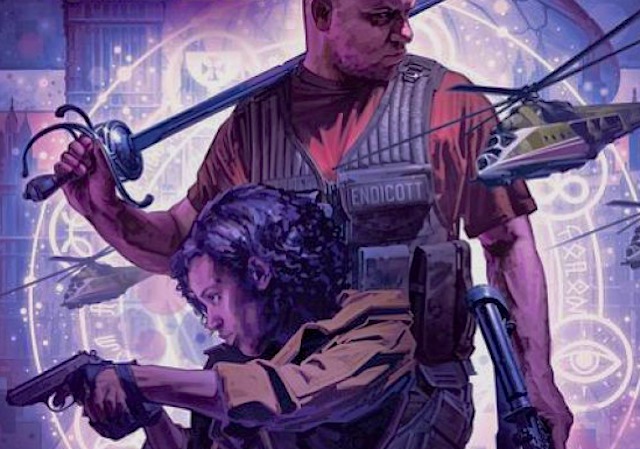
Author Tom Doyle’s American Craft series marries the social expectations of people living in traditionally military families with the idea of magical lineages. Doyle explains it in this Reddit AMA:
“The idea of the craft running in families was partially inspired by long-running military families like the Truscotts–they seem to have a culture unto themselves. […] The requirement of service is present for all the families, but most families can get away with just some of the members serving some of the time (as you’ll see with certain new American characters in The Left-Hand Way.) And, regarding freedom, most craftspeople want to serve—I don’t say this explicitly, but the craft for the Right-Hand families seems to go with an impulse to put it to a use that serves the land.”
The limiting of magic use to defined family lines sidesteps the issues that Shadow Ops and Fullmetal Alchemist tackle, by having magic power resemble an inherited fortune. Certain families can use magic because they’ve always been able to use magic, similar to how certain families in our own society—European royals, Rockefellers, Hiltons—have money because they’ve always had money. This exclusivity creates an interesting dynamic when applied to military service, since training and access to magic is divided between the military and family. The division brings up interesting questions in regards to loyalty, and the exclusivity of magic puts an interesting spin on magic users that arise outside of those families.
The series is still ongoing—the second book The Left-Hand Way just came out earlier this August—so it will be interesting to see whether this method of militarizing magic will result in an aristocracy, or something else entirely.
Aristocracy
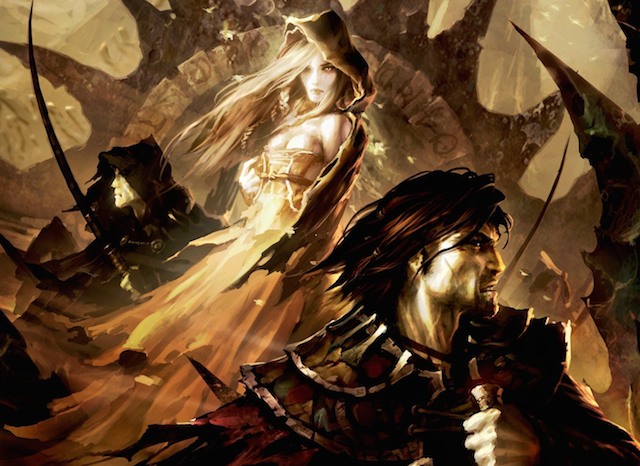
Glen Cook’s Black Company fantasy series, credited with providing the template for the “grimdark” style of fantasy, also gave us a living, evolving world with magic at its center. The story kicks off when a wizard named Bomanz attempts to make contact with the Lady, a powerful sorceress who has been in an enchanted sleep for 400 years. After she manipulates Bomanz into freeing her, she also wakes The Taken, ten sorcerers whom she and her husband had controlled. Together, the twelve of them set out to re-conquer the land. The Black Company, a mercenary troupe, contracts to assist the Lady and work with The Taken.
The Black Company series features the same exclusivity of magic as Tom Doyle’s American Craft series, but it takes a further, and more traditional, step in equating the most powerful magic users with those most deserving of rule. The Lady and The Taken comprise an aristocracy of wizards and devote the use of their power to toppling existing power structures and instilling their own.
They aren’t an army, but they are militarized, and as the series progresses this aristocracy’s magical knowledge becomes increasingly applied to their non-magical military. The Company uses their own magic in warfare, mostly as a tool in espionage, and since wizards aren’t too common they also rely on rumors and misinformation to exaggerate their skill and keep their enemies fearful. The Taken, meanwhile, conjure storms, weaponry, and detailed illusions during battle. The Lady casts spells on soldiers’ armor to enhance it, and creates a hammer made of light to defend herself at one point. However, absolute focus must be kept to maintain this sort of power—if a sorcerer allows anger or panic to distract them they’ll lose their magical protection, and be reduced to “merely” physical fighting.
The Black Company can make small amulets and charms for themselves, and the Taken literally have magical flying carpets, which they use in aerial battles against their enemies. This kicks off a magical arms race, as both sides try to develop stronger carpets and better bombs. This arms race results in the gradual loss of the aristocracy’s exclusive use on magic power. “Civilians” figure out that they can utilize magical power stored in True Names, and that correctly naming a magical foe can rob them of their strength. (This information is not exactly kept hidden by The Lady and The Taken. A decisive battle in the first trilogy hinges on the Lady finding the True Name of her evil ex-husband, The Dominator.) As the series continues, The Taken promotes the use of magic beyond themselves and the military, beginning research and development into healing herbs—not to be hoarded by the military, as the Company members immediately think, but as a potential farm crop for civilian use.
Glen Cook’s Black Company series presents an interesting flip from a series like Myke Cole’s Shadow Ops. The former begins with magical power centralized while the latter begins with it decentralized, but both series use magic power to bolster their armies. In either series, the more that magic is used, the more decentralized it becomes. Therefore, if we accept that the introduction of magic always leads to wizard armies, then is it also true that continued use of wizard armies eventually leads to entire societies dependent on magic?
Dependence
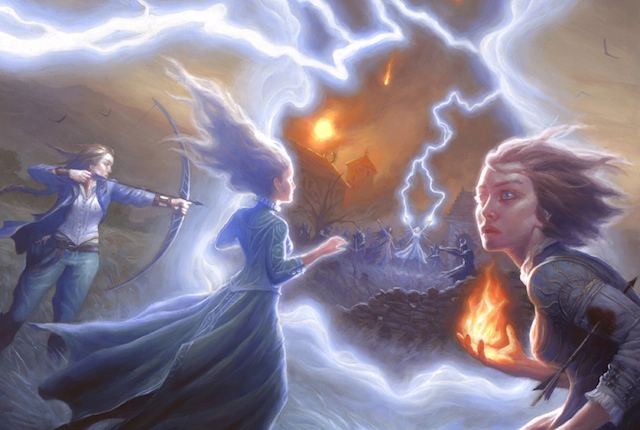
Robert Jordan’s Wheel of Time series features all of the above approaches and more. Conscription is utilized by both the male and female users of magic (known as the One Power in this series), problems caused by magical legacies feature heavily in the narrative, and magical aristocracy is rampant. All of these methods support the other, and over the course of the series the breaking and re-forming of these systems is what proves vital to the defeat of the series’ villain. Notably, the series’ hero Rand repeatedly breaks the aristocratic hold on the One Power, digging up lost magical knowledge while doing so, only to later institute his own extremely flawed aristocracy in the form of The Black Tower. (The White Tower, the pre-existing aristocracy, meanwhile, reforms and provides by far the most useful front against the series’ Big Bad.)
There has never been a magic-less world in The Wheel of Time and the back and forth between pre-existing and new systems of control illustrates just how dependent society is on that reality. Magic users negotiate peace between nations, exist as the primary health care system, and hoard not just magical knowledge but any knowledge they deem of use. Arguably, this is done to preserve a society that has suffered world-shattering setback after world-shattering setback, but in reality the dependence of the Wheel of Time’s society on magic completely stymies its overall progress.
Interestingly, forming magic users into military units goes a long way towards reversing the halt set upon the progress of society in Jordan’s series. Several groups of magic users form up into combat units over the course of the story, creating communities that share knowledge and tactics that prove key; not only to defeating the enemy, but in creating systems of education and defense that the population can utilize without needing access to magic or magic users.
As we’ve seen, the exclusivity of magic can lead to tyranny, and the non-exclusivity of magic can lead to dependence. Clearly, an army needs to be able to bring forces to bear that can match the power of magic without having to utilize magic itself. Otherwise, something like the following could happen.
Invasion
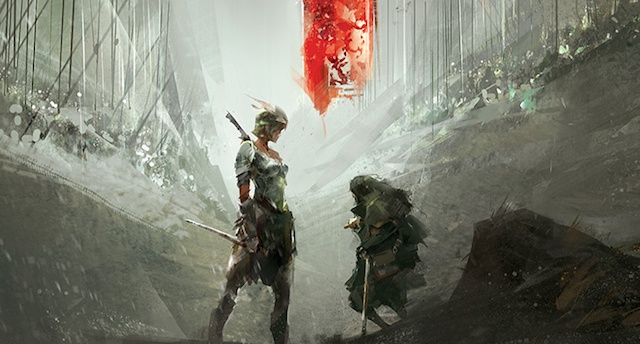
The organization of magic in Kameron Hurley’s The Mirror Empire is very fluid: Magic users draw their power from various satellites in the sky, and their magic necessarily waxes and wanes depending on the orientation of the stars. In The Mirror Empire, one of those dark stars, Oma, has returned to the sky for the first time in centuries; its reappearance heralds change and destruction. In fact, the warring Dhai people take advantage of this auspicious occasion to cross between parallel realities in order to invade and conquer themselves in the “prime” world. In contrast to the “prime” Dhai, who are scholars and pacifists, the mirror-universe Dhai have equated magic with mobilization, drafting all of their magic users and utilizing them to attack across dimensions.
The prime Dhai have magic that can balance the war Dhai, but lack the discipline or training necessary to turn back the invaders. We’ve seen magic considered as simply another weapon, another tool, in the expansive arsenal of the military. But as The Mirror Empire demonstrates, you cannot simply match power for power and expect victory, or even stability. Hurley’s series thus far demonstrates the usefulness of a military in regards to providing defense and deterrence.
Balance
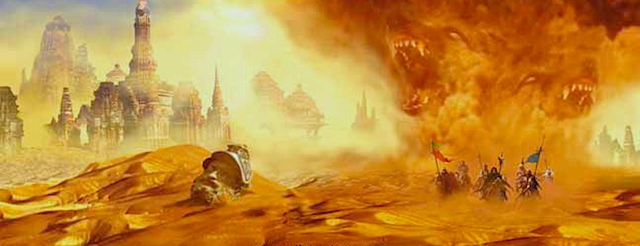
Demonstrating the usefulness of military tactics and training for defense and deterrence is something at which Steven Erikson and Ian Cameron Esslemont’s Malazan series excels. Mages and gods are shown as being extremely efficiently integrated into the Malazan Empire’s military strategies and deployments, allowing the Malazans to take on larger forces than they should realistically be able to handle. While surrounding nations and peoples match and often exceed the might of the Malazan Empire’s magical forces, the Malazan utilize superior strategy and efficiency to overcome these power gaps, often triumphing over stronger enemies; enemies which the Empire subsequently folds into its own forces. The ubiquity of magic and wizard armies in the world of Malazan has ensured balance between nations in both their magical might and non-magical armed forces. Because, as the Malazan series demonstrates, even an inch of difference in the balance between militaries of separate nations can result in the decimation of an entire culture.
There is a significant downside to maintaining this balance between magical and non-magical armies, however: Continuous warfare. A nation that has to focus overly much on defense cannot spare resources to grow technologically or economically unless that growth is in support of a continuing war effort. The state of tension also takes a toll on the populace, disincentivizing efforts for individuals and organizations to institute long-view economic growth or social reform. A nation constantly at war is devalued overall. Because if it won’t be here tomorrow, then why build it today?
As we can see, the fantasy genre’s varied approaches to militarizing magic reveal a fascinating continuum of societal evolution when looked at comparatively. We’ve seen how militarization can both help and harm a newly magical society, how it can lead to entirely magical worlds, how it can stall the growth of a society, and how it can break that stall.
What we haven’t yet seen, though, is how militarization can ultimately diminish the importance of magic, and how that may be the best possible outcome.
Beyond Magic

The Legend of Korra, the sequel series to Avatar: The Last Airbender, begins as Korra, the new Avatar, sets out from her home in the Southern Water tribe to learn airbending in Republic City (the capital of the multicultural United Republic of Nations). As in the original series, the ability by certain people to manipulate fire, water, earth, or air (known as “bending”) is used in any number of ways, from completing mundane tasks or civil projects to competitive sports, law enforcement, and military operations; traditionally, the warriors of each nation are trained according to their corresponding element (so, the Fire Nation army is made up of firebenders, and so on.)
Magic, in this instance, has long been integrated into society and benders learn how to master their innate abilities alongside their regular schooling. These abilities can be integrated into a variety of career fields, as mentioned above, and further specialization of magic occurs based on those career fields. For example, a waterbender with healing abilities can be trained to treat wounds or illness by redirecting chi around the body, while a soldier would focus on mastering various fighting techniques in order to use his or her waterbending abilities to engage and defend.
At the end of the show’s second season, Korra opens the spiritual portals, allowing the spirit world to coexist within and alongside the human world. In the final season, master metalbender Kuvira is able to harness the power of spirit vines, creating a spirit-powered superweapon. The battle against Kuvira’s spirit-fueled mecha-Colossus and her mecha-suited earth- and metalbender army requires Korra and her allies to launch an unprecedented counter-attack, featuring coordination between every type of bender as well as tech-savvy non-benders like Asami and Hiroshi Sato, Varrick, and Zhu Li.
Eventually Korra uses the Avatar state to protect herself and Kuvira from the weaponized spirit-tech, inadvertently opening a new portal to the spirit world, and the two women are able to confront one another face to face. Hostilities cease, balance is restored, and (as in the final episode of ATLA ), mercy and understanding win out over military might and violence.
The Legend of Korra may actually represent a fitting endpoint for the creation of magical armies. In the end, the training provided by militaries and the various abilities of the magic users in the world of Korra zero each other out. The ultimate conflict in the series isn’t won by superior training, magical super weapons, advantageous disruption of balance, or exclusivity of magical abilities—even though all of these tactics are utilized—but face to face negotiation.
Because when an entire society can utilize magic, then you have to go beyond magic to find solutions.
Background research for this article contributed by Bridget McGovern, Leah Schnelbach, Sarah Tolf, and Natalie Zutter.
Chris Lough writes a lot for Tor.com, you see.









